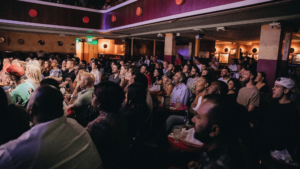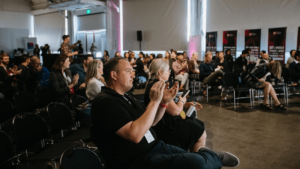Eventbrite hosted the RECONVENE summit in May 2021, bringing together thousands of event producers. We’re sharing key takeaways from popular sessions — on topics like safely returning to in-person events, building a global audience, and best practices for attracting more attendees — on our blog and our RECONVENE Recaps hub.
Brandon Collins’ last in-person event prior to the pandemic was one of his Drunk Black History show at a venue in New York’s Lower East Side. In February, less than a month before the world changed, 150 people showed up to the quarterly event that highlights the impact of Black historical figures or events that haven’t gotten their due.
Since then, Drunk Black History has gone global. At a recent virtual event, attendees joined from Australia, London, and Hawaii — a big change for what has traditionally attracted a local crowd.
Collins, who’s the co-founder of Drunk Black History, recently launched a new production company, Casa de Collins, and also hosts the podcast “Medium Popcorn.” During Eventbrite’s RECONVENE summit, he discussed building a global audience for what was once a local event. Here are five takeaways for creators.
Watch Brandon Collins’ full talk below:
Expand your marketing efforts to reach a global audience
Prior to the pandemic, Collins would do outreach with local podcasts and publications, like New York’s NY1 and TimeOut NY. After transitioning to remote events, he realized he could promote his shows in lots of different markets. He joined podcasts and did publicity with outlets around the globe, which helped increase his brand’s visibility and grow his fan base.
Collins also invested more money in Google, Facebook, and Instagram ads, instead of focusing solely on local press outlets to market events. Spending the money “hurt a little bit,” he said, but it “helped expand the range of people and eyeballs that find out about my events.”
[cta id=”228563″]
Focus on new sponsors
Finding new sponsors helped offset costs for talent, a Zoom pro account, and other expenses. Going virtual and suddenly having a bigger audience opened up a wide variety of potential sponsors, Collins said, and their support helped his brand achieve its global goals.
Survey new, global audience members
Collins asked attendees to fill out a survey and let him know where they were joining from and what about his events appealed to them. That helped him focus his marketing efforts.
Surveying your fan base also provides a valuable sense of what they’re interested in, and if they prefer in-person, virtual, or hybrid events. “You want to make sure you understand where your audience is coming from and what their needs are “before you determine the course of action in a post-COVID world,” Collins said.
For example, surveying helped him learn that his film podcast has to continue doing virtual events. It only has a small audience in New York; most fans are in the South and Midwest.
Stay organized online — and in old-school ways
Collins uses Google Keep, a note-taking service, to keep track of his tasks, and he has a whiteboard behind him, which he uses to log projects. Some of his other organization tips include:
- Use technology to stay on top of calendar, tasks, and contacts in order to provide a smooth transition from local to global events.
- Make a detailed outline with your virtual event’s tagline (which is how you’ll sell it to publications and prospective audience members), budget, required talent, and “the hook.”
- Keep records of your finances including expenses, talent, and materials.
- Ahead of each show, test your personal tech and the equipment your talent will be using.
Keep budgets tight
As your events expand from local to global, it’s critical to maintain a tight budget, Collins says. His advice:
- Make sure you pay your talent fairly, but don’t overpay or promise unrealistic numbers.
- Only pay for marketing that you can’t implement organically or through your immediate network.
- Use revenue to improve production while continuing to allow for event budgets. Collins, for example, invested in a new mixer that allows him to do sound effects and make events more engaging.
- Seek sponsors as early as possible to help cover costs.






